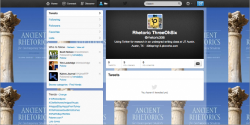
When I talk to fellow teachers about students in Rhetoric 306, the complaint is curiously uniform: students struggle with limiting their engagement with a source to the level of rhetoric. Though the distinction between a particular argument and the subject of that argument can seem perfectly clear to teachers in the field, it’s a divide that continues to puzzle students, sometimes deep into a semester.





